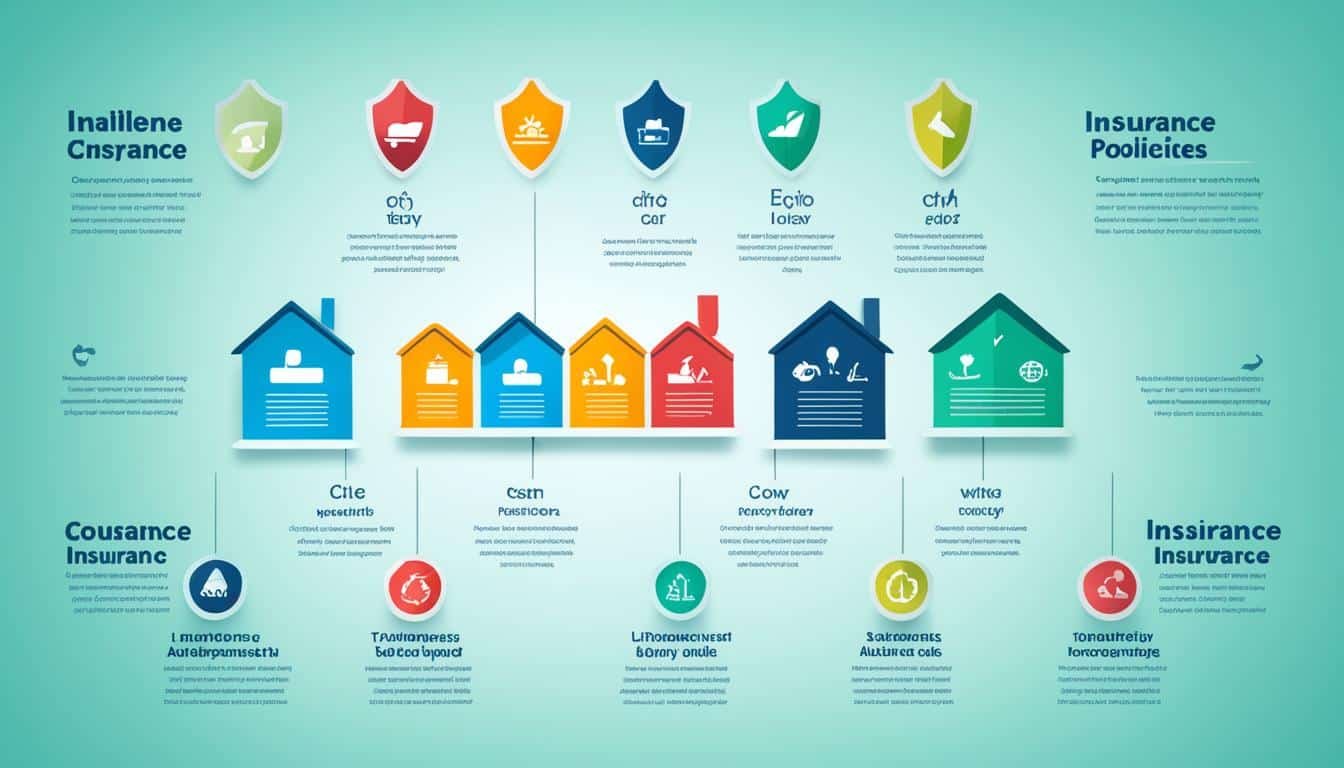Insurance plays a critical role in safeguarding our financial well-being by providing protection against unexpected losses. It is vital to understand the various insurance types available to make informed decisions and choose the right policies to meet individual needs.
Key Takeaways: Insurance Types
- There are several types of insurance to consider, including life, health, auto, long-term disability, home, renters, and umbrella insurance.
- Life insurance provides financial support for loved ones after death, while health insurance covers medical expenses.
- Auto insurance protects against accidents and damage, while home insurance safeguards homes and belongings.
- Renters insurance provides coverage for personal belongings and liability in rental properties.
- Umbrella insurance offers additional liability protection beyond primary insurance policies.
- When choosing an insurance policy, consider coverage options, such as term life insurance or permanent life insurance, and employer-sponsored healthcare or individual health insurance.
- Evaluate personal needs and carefully consider the coverage options available.
Life Insurance
Life insurance is a crucial type of insurance that provides financial protection for our loved ones in the event of our death. It offers peace of mind by ensuring that our family members are financially supported and can maintain their standard of living even after we are gone.
There are two main types of life insurance to consider: term life insurance and whole life insurance. Understanding the differences between these options helps us make an informed decision based on our needs and financial goals.
Term Life Insurance:
Term life insurance provides coverage for a specified period, such as 10, 20, or 30 years. It is often the most affordable option as it focuses solely on providing a death benefit and does not accumulate cash value. This type of insurance is ideal for individuals who want coverage for a specific period, such as when they have dependents or a mortgage.
Whole Life Insurance:
Whole life insurance, also known as permanent life insurance, offers lifelong coverage. In addition to the death benefit, it includes a cash value component that grows over time. This cash value can be accessed during our lifetime through policy loans or withdrawals, providing a source of additional financial flexibility. Whole life insurance is suitable for individuals who want lifelong coverage and the opportunity to accumulate cash value for future needs.
When choosing a life insurance policy, it is crucial to consider the coverage amount. The coverage amount should typically be around 10 times our annual income to ensure that our loved ones are adequately protected. By determining the appropriate coverage amount, we can provide financial security for our family members and help them maintain their lifestyle in our absence.
Life insurance is an important part of our overall financial plan. It allows us to prioritize the well-being of our loved ones and provides them with the financial support they need during a difficult time. Whether we choose term life insurance or whole life insurance, it is essential to carefully consider our coverage needs and select a policy that aligns with our long-term goals.
Health Insurance

Health insurance is a crucial investment that protects individuals and families from the high costs of medical care. It offers financial coverage for a range of healthcare services, including doctor visits, medications, hospital stays, and preventive care. Without health insurance, these expenses can quickly accumulate, creating a significant financial burden.
There are multiple options for obtaining health insurance coverage. Many individuals are fortunate enough to have access to employer-sponsored healthcare, which is often the most convenient and affordable option. Employer-sponsored healthcare plans are provided by employers to their employees, and the cost is often shared between the employer and the employee. The average annual premium cost for a family plan in 2022 is $22,463.
If employer-sponsored healthcare is not available, individuals can explore coverage options through the federal health insurance marketplace. The federal health insurance marketplace offers a range of health insurance plans from various insurance companies. Individuals can compare different plans based on their coverage needs, deductibles, co-pays, and network providers. The federal health insurance marketplace also offers opportunities to receive financial assistance based on income and household size.
Alternatively, individuals can contact health insurance companies directly to find individual or family coverage. Many insurance companies offer a variety of health insurance plans tailored to different needs and budgets. When selecting a health insurance policy, it is important to carefully consider the coverage options and evaluate factors like deductibles, co-pays, and network providers.
Table: Comparison of Health Insurance Coverage Options
| Coverage Options | Pros | Cons |
|---|---|---|
| Employer-Sponsored Healthcare | – Often the most convenient and affordable option – Employer and employee share the cost of premiums – Typically includes a range of coverage options |
– Limited to individuals with access to employer-sponsored plans – Coverage may change if employment status changes |
| Federal Health Insurance Marketplace | – Wide selection of plans from various insurance companies – Opportunity for financial assistance based on income – Ability to compare different coverage options |
– Application and enrollment process may take time – Coverage may vary based on the plan chosen |
| Directly Contacting Insurance Companies | – Flexibility to choose from different insurance providers – Ability to customize coverage based on individual needs |
– Requires independent research and evaluation of various plans – May involve a higher cost compared to employer-sponsored or marketplace plans |
Health insurance is an essential safeguard for individuals and families, providing financial peace of mind in the face of unexpected medical expenses. By selecting the right coverage option, individuals can ensure they have access to necessary healthcare services while minimizing out-of-pocket costs.
Long-Term Disability Insurance

Long-term disability insurance is a type of coverage that provides crucial income protection in the unfortunate event that we become unable to work due to a disability or illness. It offers financial support to ensure that we have a steady stream of income, even if we are unable to earn it ourselves.
This type of insurance is often offered by employers as part of their benefits package. However, if it is not available through our employer, we have the option to purchase it independently. Long-term disability insurance is particularly important for individuals who rely on their income to support themselves and their families.
When selecting a long-term disability policy, there are several factors to consider to ensure that it meets our needs effectively. One crucial consideration is the waiting period before coverage begins. This is the period of time that needs to elapse from the onset of the disability until we start receiving benefits. It is important to choose a waiting period that aligns with our financial circumstances.
Another significant factor to consider is the maximum coverage duration. This refers to the length of time that benefits will be paid out in the event of disability. We should choose a policy with a duration that matches our specific needs.
Policy exclusions are also important to review. These are specific conditions or circumstances that are not covered by the insurance policy. It is essential to carefully read and understand the policy exclusions to ensure that we are fully aware of any limitations or restrictions.
Key Features of Long-Term Disability Insurance:
Income Protection: Long-term disability insurance provides a reliable source of income in the event of a disability or illness that prevents us from working.
Flexibility: This type of insurance can be obtained through an employer or purchased independently, giving us options that fit our individual circumstances.
Guaranteed Income Replacement: A good long-term disability policy guarantees a specific percentage of our pre-disability income, ensuring financial stability during challenging times.
Waiting Period: We should carefully consider the waiting period before coverage begins to select a policy that aligns with our financial situation.
Maximum Coverage Duration: The duration of benefits payout is an important factor in choosing a policy that meets our long-term needs.
Policy Exclusions: We must review policy exclusions to understand any conditions or circumstances that are not covered by the insurance policy.
Long-term disability insurance offers peace of mind by protecting our income and financial well-being in the face of unexpected disabilities or illnesses. By carefully considering the waiting period, maximum coverage duration, and policy exclusions, we can choose a policy that provides comprehensive coverage and ensures our long-term financial security.
| Advantages of Long-Term Disability Insurance | Disadvantages of Long-Term Disability Insurance |
|---|---|
| Provides financial stability during disability | Premiums can be costly |
| Offers income protection for individuals and families | Policy exclusions may limit coverage |
| Gives us the option to purchase coverage independently | There may be waiting periods before receiving benefits |
| Guarantees a percentage of pre-disability income | Some pre-existing conditions may be excluded |
Auto Insurance
Auto insurance is an essential requirement for protecting both ourselves and our vehicles against accidents and damages. To ensure adequate coverage, it’s important to understand the key components of auto insurance policies, including liability coverage, comprehensive coverage, and uninsured/underinsured motorist coverage.
Liability Coverage
Liability coverage is a legal requirement in nearly every state. It provides financial protection if you cause property damage or injuries to others while driving. In the event of an accident, your liability coverage will cover the cost of repairing or replacing the other party’s vehicle and any medical expenses they may incur.
Having sufficient liability coverage is crucial because if the damages exceed your coverage limits, you may be personally responsible for the remaining costs. It’s advisable to carefully consider your assets and potential liabilities when deciding on the appropriate liability coverage limit for your auto insurance policy.
Comprehensive Coverage
Comprehensive coverage offers additional protection for your vehicle beyond just accidents with other vehicles. This coverage is designed to safeguard against damage caused by events such as theft, vandalism, natural disasters, falling objects, or collisions with animals.
With comprehensive coverage, you can have peace of mind knowing that your vehicle is protected from a range of potential risks, regardless of whether they involve other drivers or not. It can help cover the cost of repairs or, in some cases, replace your vehicle if it is stolen or damaged beyond repair.
Uninsured/Underinsured Motorist Coverage
Uninsured/underinsured motorist coverage is an important component of auto insurance. It provides protection for you and your vehicle if you are involved in an accident with a driver who either doesn’t have insurance or has insufficient coverage to fully compensate for the damages.
In such situations, your uninsured/underinsured motorist coverage can help cover the costs of your vehicle repairs, medical expenses, and any other damages you may suffer. This coverage ensures that you aren’t left financially burdened if you’re involved in an accident with an uninsured or underinsured driver.
Choosing the Right Auto Insurance
When selecting an auto insurance policy, it’s important to consider your state’s requirements, your coverage needs, and any additional optional add-ons that may be available. By carefully assessing these factors, you can ensure that you have the appropriate coverage to protect both yourself and your vehicle.
Auto insurance is a crucial investment that provides financial security and peace of mind on the road. By understanding the different coverage options available and selecting the right policy, you can confidently navigate the unexpected and protect yourself from potential financial losses.
Home Insurance

Home insurance is a crucial safeguard for your property and belongings against unexpected events such as fire, theft, and natural disasters. It provides you with peace of mind and financial protection in times of crisis.
One important aspect of home insurance is dwelling coverage. This coverage protects the physical structure of your home, including the walls, roof, and foundation, in case of damage or destruction. It ensures that you can rebuild or repair your home without incurring significant financial burden.
Another key component of home insurance is personal property coverage. This coverage extends to your belongings within the property, such as furniture, appliances, and electronics. In the unfortunate event of theft, fire, or other covered perils, your personal property coverage will help replace or repair your damaged or stolen belongings.
Liability coverage is an integral part of home insurance policies. It protects you financially if someone is injured while on your property and you are found legally responsible. This coverage can help cover medical expenses, legal fees, and other related costs that may arise from such incidents.
When selecting a home insurance policy, it is essential to consider various factors. Make sure that the dwelling coverage amount is sufficient to rebuild your home in case of a total loss. Assess the value of your personal belongings and ensure that the coverage limit adequately protects them. Additionally, evaluate the liability coverage limit to ensure it offers sufficient protection.
Importance of Home Insurance
“Home insurance provides vital financial protection for your home and belongings. It safeguards you from the financial risks associated with unexpected events and provides peace of mind.”
With home insurance, you can rest assured that you are financially protected against unforeseen circumstances that can damage or destroy your home or personal belongings. It is a smart investment that provides security and eases the financial burden during difficult times.
For comprehensive coverage tailored to your specific needs, it is recommended to consult with reputable insurance providers and compare quotes. By choosing the right home insurance policy, you can enjoy the comfort of knowing that your home and belongings are protected.
| Coverage | Description |
|---|---|
| Dwelling Coverage | Protects the structure of your home against damage or destruction |
| Personal Property Coverage | Covers your belongings within the property, such as furniture, appliances, and electronics |
| Liability Coverage | Protects you financially if someone is injured on your property and you are found legally responsible |
By investing in home insurance, you are taking a proactive step towards protecting your most valuable assets. Don’t wait until it’s too late; secure your home and give yourself the peace of mind you deserve.
Renters Insurance

When renting a property, it’s important to protect your personal belongings and have liability coverage in case of unexpected events. Renters insurance offers the financial security you need to safeguard your possessions and protect yourself from potential liabilities.
Personal Property Coverage: With renters insurance, you can rest easy knowing that your personal belongings are protected. Whether it’s furniture, electronics, or clothing, your insurance policy reimburses you for the loss or damage of your belongings caused by fire, theft, vandalism, and other covered perils.
Liability Coverage: Accidents can happen anywhere, including your rental property. If someone is injured while on your premises or if you accidentally cause damage to someone else’s property, renters insurance provides liability coverage. This coverage protects you from potential legal and financial consequences by paying for medical expenses or property repairs resulting from such incidents.
Although renters insurance is not mandatory by law, many landlords require it as a condition of renting. This requirement ensures that both you and your landlord are protected against potential losses. By having renters insurance, you demonstrate your responsibility as a tenant and give your landlord peace of mind.
When choosing a renters insurance policy, it’s essential to consider the value of your belongings and the level of liability coverage needed. Assess the total worth of your possessions to determine the appropriate personal property coverage limit that suits your needs. Additionally, consider your potential liability risks and select a policy that provides adequate protection in case of unfortunate incidents.
The Benefits of Renters Insurance
“Renters insurance offers peace of mind by safeguarding your personal belongings and providing liability coverage. It’s a small investment that can make a big difference in protecting your assets and financial well-being.”
Table:
| Benefits of Renters Insurance | |
|---|---|
| Protection for your personal belongings | Reimburses you for damage or loss caused by covered perils |
| Liability coverage | Protects you from financial responsibilities due to injuries or property damage |
| Landlord requirement | Meets the condition of renting and provides peace of mind for both you and your landlord |
By securing renters insurance, you protect not only your personal belongings but also your financial future. This coverage ensures that you are prepared for unexpected events and gives you the necessary support when you need it the most.
Umbrella Insurance

Umbrella insurance offers additional liability coverage that goes beyond the limits of our primary insurance policies, such as auto and home insurance. It provides extra protection and ensures that our assets are safeguarded in the face of a lawsuit or significant financial loss. By having umbrella insurance, we can have peace of mind knowing that we have an extra layer of coverage to mitigate potential risks.
One of the key advantages of umbrella insurance is that it can provide coverage for claims that exceed the limits of our primary policies. This means that if we are faced with a large liability claim, umbrella insurance can help cover the costs that go beyond what our primary policies would typically cover. It acts as an additional safety net for unexpected and potentially costly situations.
Umbrella insurance can be especially beneficial for individuals with significant assets or those who have high-risk factors. It is designed to protect our wealth and assets from being depleted in the event of a lawsuit. With umbrella insurance, we can protect our savings, investments, and valuable possessions, ensuring that our financial well-being remains intact even in challenging circumstances.
When considering umbrella insurance, it is important to assess our liability risk and evaluate the value of our assets. This will help determine if additional coverage is necessary to adequately protect ourselves and our financial interests. Consulting with an insurance professional can provide valuable insights and guidance in selecting the right umbrella insurance policy that suits our specific needs.
| Benefits of Umbrella Insurance | Risks Covered |
|---|---|
| 1. Additional liability coverage | 1. Personal injury liability |
| 2. Protection beyond primary policies | 2. Property damage liability |
| 3. Coverage for high-risk factors | 3. Legal defense costs |
| 4. Asset protection | 4. Libel and slander liability |
Case Study: Protecting Your Wealth with Umbrella Insurance
“I never thought I would need umbrella insurance until my neighbor slipped and fell on my property. The medical bills and legal costs quickly added up, but thankfully, my umbrella policy provided the additional coverage I needed. It protected my assets and prevented a significant financial setback. Investing in umbrella insurance was one of the best decisions I made to safeguard my wealth.”
– Emily Brown, satisfied umbrella insurance policyholder
Life Insurance

Life insurance is an essential financial tool for providing protection and peace of mind to our loved ones in the event of our death. It ensures that our family members and dependents are financially secure, even in our absence. When considering life insurance options, there are two primary types to choose from: term life insurance and permanent life insurance.
Term Life Insurance
Term life insurance provides coverage for a specific period of time, such as 10, 20, or 30 years. It offers a death benefit to the beneficiaries if the insured individual passes away during the specified term. Term life insurance is often the most affordable option and is suitable for individuals with temporary financial obligations and responsibilities.
Term life insurance can be particularly beneficial for individuals who have young children, outstanding debts like mortgages or loans, or those who want to ensure financial stability for their dependents during critical periods, such as college or retirement planning.
Permanent Life Insurance
Permanent life insurance, also known as whole life insurance, provides lifelong coverage. It offers a death benefit to the beneficiaries regardless of when the insured individual passes away, as long as the policy is active and premiums are paid. Permanent life insurance also includes a cash value component that accumulates over time, providing a savings or investment feature.
The cash value of a permanent life insurance policy can be accessed during the policyholder’s lifetime. It can be used for various purposes, such as supplementing retirement income, funding educational expenses, or covering unforeseen financial emergencies.
Choosing the Right Life Insurance Policy
When selecting a life insurance policy, it is important to consider our individual financial obligations and long-term goals. Assessing factors such as mortgage payments, outstanding debts, future educational expenses, and desired lifestyle for our loved ones can help determine the appropriate coverage amount and policy type.
In addition, consulting with a reputable insurance professional can provide valuable guidance in understanding the different policy options available and their suitability to our specific needs. They can help analyze our financial situation, evaluate risk factors, and recommend policies that align with our financial goals and provide the necessary protection.
Ultimately, life insurance serves as a vital tool for protecting our loved ones and ensuring their financial well-being in the face of life’s uncertainties. By choosing the right life insurance policy, we can provide a lasting legacy and valuable support during challenging times.
Health Insurance

Health insurance is crucial for protecting ourselves and our families from the high costs of medical care. It provides financial security and peace of mind during times of illness or injury. When considering health insurance options, there are two main avenues to explore: employer-sponsored healthcare and individual health insurance.
Employer-Sponsored Healthcare
Many employers offer health insurance coverage as part of their benefits package. This type of healthcare is often the most convenient and affordable option for individuals and families. By participating in an employer-sponsored plan, employees can receive comprehensive coverage at a reduced cost. The employer typically subsidizes a portion of the premium, making it more affordable for employees to obtain coverage.
Employer-sponsored healthcare plans vary in terms of coverage levels, network providers, and out-of-pocket costs. It is important to carefully review the available options and choose a plan that meets your healthcare needs. Consider factors such as doctor networks, prescription coverage, deductible amounts, and co-pays when selecting a health insurance policy through your employer.
Individual Health Insurance
If employer-sponsored healthcare is not available or doesn’t meet your needs, you can explore individual health insurance options. Individual health insurance allows you to purchase coverage directly from insurance companies or through the federal health insurance marketplace.
Individual health insurance plans provide flexibility in choosing coverage options that align with your specific healthcare needs. You can select from a range of plan types, such as HMOs, PPOs, and high-deductible plans. It is important to review the details of each plan, including doctor networks, prescription coverage, and out-of-pocket costs, to ensure the plan meets your healthcare preferences and budget.
When considering individual health insurance, it is also important to assess your eligibility for any government subsidies or tax credits that can help reduce the cost of coverage. The federal health insurance marketplace provides a platform where you can compare and purchase individual health insurance plans, making it easier to find coverage that fits your needs and budget.
Regardless of whether you choose employer-sponsored healthcare or individual health insurance, having coverage is essential for safeguarding your health and finances. Medical emergencies and unexpected health issues can occur at any time, and having health insurance ensures that you have access to the necessary care without incurring significant out-of-pocket costs.
| Employer-Sponsored Healthcare | Individual Health Insurance |
|---|---|
| Convenient and affordable option | Flexibility to choose coverage options |
| Employer subsidizes a portion of the premium | Possible eligibility for government subsidies or tax credits |
| Varies in coverage levels, network providers, and out-of-pocket costs | Availability of different plan types (HMOs, PPOs, high-deductible plans) |
| Review factors such as doctor networks, prescription coverage, and deductible amounts | Consider doctor networks, prescription coverage, and out-of-pocket costs |
Also Read: Navigating Financial Storms: Emergency Loans for Quick Financial Relief
Conclusion
In conclusion, understanding the different types of insurance available is crucial for protecting ourselves and our assets. Life insurance provides vital financial support for our loved ones in the event of our death, while health insurance helps cover the costs of medical care. Auto insurance safeguards us in case of accidents, and home insurance protects our homes and belongings from unexpected events.
By carefully evaluating our individual needs, we can choose the right insurance policies and coverage options to ensure we have the necessary financial protection for a secure future. Whether it’s term life insurance or whole life insurance, employer-sponsored healthcare or individual health insurance, liability coverage or comprehensive coverage, it’s essential to consider our specific requirements and select the best-suited options.
Remember, insurance not only provides us with peace of mind but also offers a safety net that helps us navigate unforeseen circumstances without bearing the full financial burden. So, take the time to assess your needs, understand the available coverage options, and make informed decisions to protect yourself, your loved ones, and your assets.
FAQs
Q: What are the different types of insurance policies available?
A: There are various types of insurance policies such as car insurance, homeowners insurance, liability insurance, long-term care insurance, pet insurance, universal life insurance, and more.
Q: How does insurance help in protecting my assets?
A: Insurance helps protect your assets by providing financial coverage in case of unexpected events like car accidents, damage to your property, or health-related expenses.
Q: What is travel insurance and why is it important?
A: Travel insurance is a type of insurance that covers unforeseen events during travel such as trip cancellations, medical emergencies, lost baggage, and more. It is important for ensuring peace of mind while traveling.
Q: What is long-term care insurance and when should I consider getting it?
A: Long-term care insurance helps cover the costs of long-term services and support for individuals with chronic illnesses or disabilities. It is recommended to consider getting it as early as possible to secure coverage for future healthcare needs.
Q: How does universal life insurance differ from other types of permanent life insurance?
A: Universal life insurance offers flexibility in premium payments and death benefits compared to other permanent life insurance policies. It allows policyholders to adjust coverage and premiums according to their financial situation.
Q: What is the significance of having comprehensive insurance coverage?
A: Comprehensive insurance provides coverage beyond basic liability protection, including coverage for damage to your car from non-collision incidents like theft, vandalism, or natural disasters.
Q: How do I determine the type of insurance coverage I need?
A: To determine the coverage you need, consider factors such as your assets, risks, financial situation, and specific needs. Consulting an insurance agent can also help in assessing the right coverage for your circumstances.
